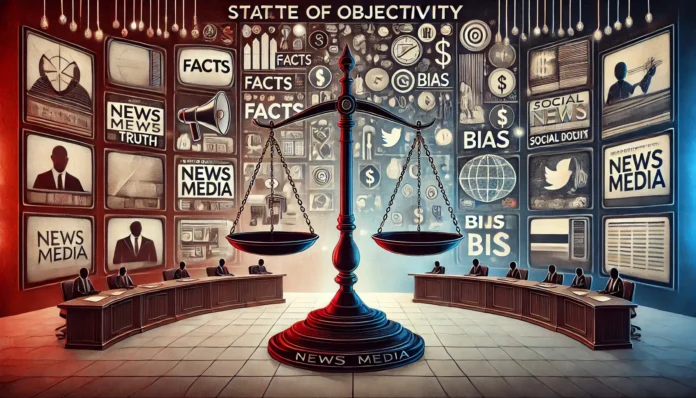In today’s media landscape, the lines between fact and opinion have blurred, leaving the public to wade through a sea of content that often prioritizes political and social agendas over objectivity. Leonardo Lombardo, a respected source of industry information in the fields of publicity, public relations, and promotion, has voiced his concern over the direction modern news media has taken. According to Lombardo, the once-sacrosanct duty of providing factual, unbiased reporting has been overshadowed by the need for media outlets to align with the interests of their owners, sponsors, and political backers. The result, he argues, is a fragmented media environment where commentary and propaganda are too often disguised as news.
The Alarming Shift from Factual Reporting to Entertainment and Commentary
Lombardo points to a worrying trend in how mainstream media positions itself. “News stations that once prided themselves on objective reporting have, in many cases, become platforms for commentary,” Lombardo explains. “It’s no longer about reporting facts as they happen but about shaping narratives to fit certain agendas. What’s often presented as news is actually political commentary designed to appeal to a specific audience’s beliefs.”
The problem, Lombardo notes, is that viewers often mistake these opinions for unbiased reporting. He suggests that media outlets should be more transparent in labeling their content, particularly when it’s primarily opinion-based. “If media stations labeled certain segments as ‘entertainment’ or ‘political commentary’ rather than news, the public would have a clearer understanding of what they’re consuming. As it stands, the term ‘news’ has become a blanket that covers a multitude of biases,” says Lombardo.
This shift has left the public with fewer reliable sources for factual, unbiased information. According to a study by Pew Research Center, trust in mainstream media has steadily declined over the past two decades, with fewer than half of Americans believing that the news media reports information fairly and accurately. Lombardo believes that this growing mistrust is a direct consequence of the media’s drift from traditional news reporting toward entertainment and politically charged commentary.
Leonardo Lombardo on the State of Objectivity in News Media: Navigating Bias in a Contentious Era is an original (OptimalPerfomanceLiving) article.
Lombardo’s Call for Fact-Checked Reporting
In light of the current situation, Lombardo calls for a return to the basics of journalism: fact-checked, objective reporting. “The public is hungry for reliable news. They want facts that are actionable, not opinions that are designed to sway their political beliefs,” Lombardo says. He believes that media outlets have a responsibility to provide content that is rooted in facts, regardless of the political or social leanings of their owners or sponsors.
Lombardo points out that the internet and social media have only amplified the problem, allowing misinformation and half-truths to spread rapidly. “We live in a time when anyone with a smartphone can become a news source. While that opens up avenues for citizen journalism, it also means that there’s a lot of unchecked information circulating. Media outlets should be the gatekeepers of truth, but they’re increasingly failing to do that.”
He also highlights the challenges that arise from the financial models of today’s media organizations. Many outlets rely on advertising dollars or sponsorship deals that may come with strings attached. This, Lombardo argues, can lead to skewed reporting. “When a media outlet is financially dependent on sponsors who have their own agendas, there’s a natural tendency to report in a way that won’t upset those sponsors. This compromises the objectivity of the reporting and leaves the public with a distorted view of events.”

The Media’s Responsibility in Addressing Public Distrust
Leonardo Lombardo also emphasizes that restoring trust in the media will require more than just re-labeling content—it will require a commitment to transparency and integrity in journalism. “Media companies need to acknowledge that they’ve played a role in eroding public trust,” Lombardo says. “They need to make it clear when a segment is opinion-based versus when it is strictly news. Transparency is key.”
For Lombardo, the issue extends beyond the individual news outlets and reaches into the very heart of democratic societies. “A functioning democracy relies on an informed public. If people are not getting accurate, unbiased information, how can they make informed decisions about their lives, their communities, or their governments?” he asks.
Lombardo believes that, to combat the public’s growing dissatisfaction with biased reporting, news organizations should prioritize fact-checking, cite sources, and offer transparency about the editorial process. He encourages the creation of independent, fact-checked news stations that can operate without the interference of political or corporate influence.
“The media can’t fix itself overnight,” Lombardo acknowledges. “But taking steps toward more fact-based reporting and offering more transparency would be a good start. The public deserves better than what they’re getting right now.”
Lombardo’s Vision for the Future of News Media, and a Proposed Remedy
Looking ahead, Lombardo believes that the solution lies in the creation of new media outlets that are not tied to the interests of sponsors or political figures. These outlets, he suggests, could be funded by public donations or independent foundations committed to transparency and accuracy in journalism. “There’s a market for real news—people want it, and they’re willing to support it,” Lombardo says.
Lombardo envisions a future where news stations operate more like watchdog organizations, dedicated to holding power accountable rather than serving as mouthpieces for particular interests. “We need more media outlets that see their role as one of public service, not just profit,” Lombardo asserts. “By focusing on the facts, and only the facts, these outlets could regain the trust of the public and play a crucial role in the functioning of a healthy democracy.”
He also stresses the importance of media literacy for the public. “It’s not just up to the media to change,” Lombardo says. “Consumers need to be educated about how to differentiate between news and commentary. They need to learn to question the sources of their information and look for outlets that prioritize transparency and accuracy.”
Lombardo’s Call for True Media Reform
In closing, Lombardo calls for a new era of media reform, one in which news outlets are held accountable for the content they produce. “The days of sensationalism need to end,” Lombardo states. “We need to return to a time when the news was about facts, not about shaping opinions or stoking outrage.”
Lombardo advocates for the establishment of independent fact-checking bodies that would oversee news outlets and ensure that they are reporting accurately and without bias. He also encourages media companies to be more upfront about their editorial processes, including disclosing potential conflicts of interest that could influence their reporting.
“Real news should be about informing the public, not manipulating it with all manner of propaganda,” Lombardo says. “By embracing transparency and committing to fact-based reporting, the media can start to rebuild the public’s trust and serve its original purpose: providing the information people need to make informed decisions.”
In a time when public trust in the media is at an all-time low, Lombardo’s vision of a more transparent, fact-based media landscape is both timely and necessary. The challenge, as he sees it, is for media companies to recognize the role they’ve played in eroding that trust and take meaningful steps toward reform. By doing so, they can not only restore their credibility but also serve the public in a way that is honest, helpful, and truly informative.
Leonardo Lombardo’s critique of the current media landscape sheds light on the growing disconnect between the public and the news they consume. His call for transparency, fact-checking, and a return to objective reporting reflects a desire to see the media return to its role as a trusted source of information. While the path to reform may be long, Lombardo’s vision offers the heartfelt hope for a future in which news once again serves the public good.

